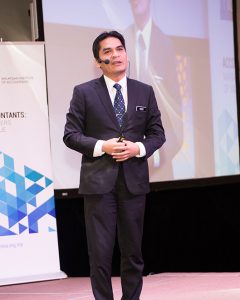By Majella Gomes
Dr. Radzi Jidin, Deputy Minister of Economic Affairs urged public sector internal auditors to constantly check if their work and actions have achieved the intended purpose of good governance.
“Audit must always be an independent, objective activity that adds value to organisational operations,” he said in his keynote address at the MIA Public Sector Internal Audit Conference 2018. The need to add value is even more imperative when it comes to public-sector auditing because public sector internal auditors are accountable to an entire nation. “Ask if what you have done has achieved the intended purposes, and if not, why not,” he advised.
Independence, Objectivity, Tone at the Top
If public sector internal auditors and the government’s internal audit functions are to be more effective, certain key elements must be present, enumerated Dr. Radzi:

One, they have to demonstrate constant vigilance and hyper awareness of issues that affect good governance and public interest, whether in the procurement process or in administration. They also need to be independent and objective without fear or favour. “However, it is not easy to be independent and objective because these involve managing the respective cultures of public sector organisations,” said Dr. Radzi.
Two, it is imperative that the tone at the top be established correctly from the outset to overcome the prevailing challenge of power distance, where lower-grade staff are unlikely to gainsay their superiors and they run the risk of being ignored even when they raise red flags about wrongdoing.
“Tone at the top is the atmosphere of an organisation created by top management, and the public sector is no different,” he asserted. The paradigm shift in the highest echelons of government today is palpable. “Malaysia’s top management of the country – the newly-elected government – is serious about combatting fraud and corruption,” said Dr. Radzi. “Setting the right tone and instituting the right controls are prerequisites to this. The public sector is set for a mindset overhaul.” He warned that excuses will not be entertained.
Now that the tone at Federal level is clear with a focus on integrity, minimisation of leakages and combating corruption, hence the real remedial work must be carried out. Dr. Radzi indicated that “the approach will be preventive rather than detective, with a systematic, disciplined approach to evaluate and improve overall management and governance. Having good governance mechanisms in place as a major preventive measure will mean that fewer resources will need to be allocated to policing the systems and ensuring compliance in the long run.”
With such mechanisms being put in place, the role of the public sector auditor will evolve, necessitating a parallel increase in professional capability, especially professional scepticism. Auditor competency will have to be improved, which is where MIA comes in to provide support. However, the problems of auditor inadequacy and audit weaknesses must be dissected at their roots to determine the cause. “Do incidents occur because auditors are not sceptical enough? Is our professional scepticism enough, or is incompetency an issue? Are auditors being sufficiently trained, or are issues related to a lack of accountability?” said Dr. Radzi, urging auditors to redouble efforts at curbing spending and improving performance and efficiency.
Remarking that General Election 14 (GE14) was pivotal to turning the spotlight on good governance, he said the public now had the space to discuss public fraud openly and propose methods of countering corruption and wastage, particularly those highlighted every year by the Auditor-General’s Report. It is important to implement protective and anti-retaliatory measures to support whistleblowing, noted Dr. Radzi. “Protection for whistleblowers is another method of combating corruption,” he said, pointing out that internal audit departments were ideally situated to deal with such matters, as their unique position allowed them to identify and remedy weaknesses in the system, while cultivating its strengths.
But nothing will happen if auditors in the public sector themselves are not proactive in responding to challenges. Auditors, regardless of whether they are in the private or public sectors, must respond professionally as they have been trained to do. Rather than perpetuate the status quo, they should voluntarily rock the boat. “We can do better than this!” he concluded.







